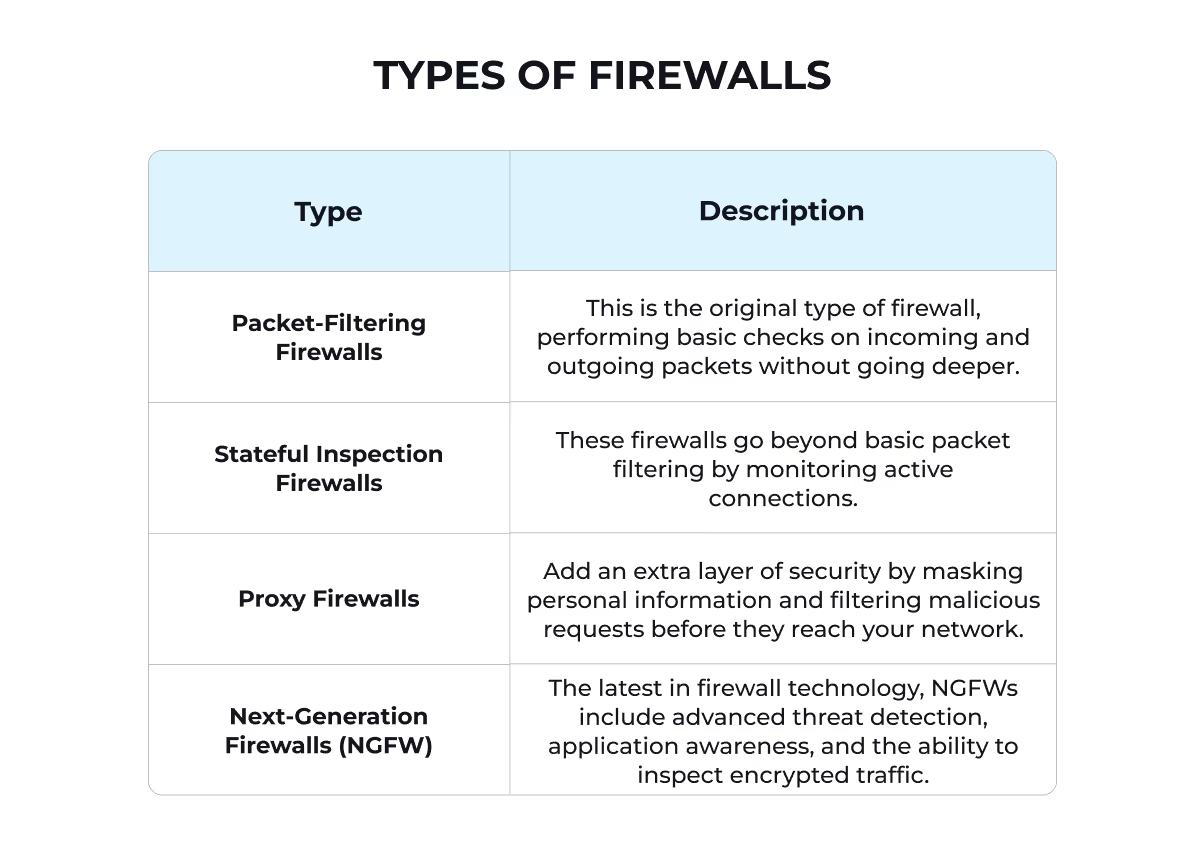.avif)
Learn what a firewall is, how it works, why it’s critical for cybersecurity, and how modern firewalls protect personal and business networks in 2025.
Did you know that global cybercrime damages are expected to reach $10.5 trillion annually by 2025? 【Cybersecurity Ventures, 2024】 With such startling numbers, it’s clear why cybersecurity is more critical than ever. And at the forefront of every effective cybersecurity strategy lies the firewall.
Whether you’re protecting your personal computer, running an enterprise network, or simply curious about how cybersecurity works, firewalls are your network’s first line of defense. These tools act as digital gatekeepers, monitoring and controlling traffic to keep out unwanted visitors.
This guide dives into what firewalls are, how they work, the various types available, and why they remain a critical component of cybersecurity in 2025. We’ll explore real-world examples, debunk common myths, and offer actionable tips to help you stay protected.
A firewall acts as a protective shield for your network, managing and filtering incoming and outgoing traffic based on specific rules. It’s like having a security guard for your system, determining what’s allowed in and what stays out.
Why is this digital bodyguard so important? Firewalls serve as a barrier, safeguarding systems from unauthorized access by controlling the flow of data between secure internal networks and untrusted external sources like the internet. Without this level of filtering, your network becomes vulnerable to hackers, malware, and cyberattacks.
At its core, a firewall works by inspecting packets of data exchanged between devices on a network. It evaluates these data packets based on IP addresses, ports, and protocols to decide whether they should be allowed or blocked.
To simplify, imagine your home has a secured main door. Every visitor knocks, and you decide whether to welcome them based on who they are. Similarly, a firewall examines requests to enter your network and blocks anything that seems suspicious or unauthorized.
"Over 90% of large organizations incorporate multi-layered firewalls into their cybersecurity strategy," says a Gartner Cyber Report, underlining the importance of these tools【Gartner Cyber Report, 2024】

This is the original type of firewall, performing basic checks on incoming and outgoing packets without going deeper. It’s useful for small networks but isn’t equipped to handle today’s complex threats.
These firewalls go beyond basic packet filtering by monitoring active connections. They analyze the context of data packets, providing more intelligent and effective control.
Acting as intermediaries between users and the internet, proxy firewalls add an extra layer of security by masking personal information and filtering malicious requests before they reach your network.
The latest in firewall technology, NGFWs include advanced threat detection, application awareness, and the ability to inspect encrypted traffic. According to Cisco’s 2025 Trends Report, 72% of companies have upgraded to next-gen firewalls to enhance security【Cisco Trends, 2025】.
How to choose the right one?
"Compare features such as intrusion detection and prevention, VPN support, application control, zero trust, and centralized management capabilities." , explains Jaspreet Sidhu, Cybersecurity Professional at PrimeCorp.
The rise in remote work has created more vulnerabilities, with hackers increasingly targeting businesses and individuals alike. A firewall serves as an essential defense against ever-changing threats.
Whether you’re running a business or handling sensitive data, GDPR, HIPAA, and PCI DSS emphasize the importance of firewalls.
Reality: Firewalls are only a single piece of the puzzle when it comes to effective cybersecurity. To ensure protection, you also need antivirus programs, routine system updates, and robust passwords.
Reality: Smartphones, tablets, and laptops are just as vulnerable as business networks. Many modern devices have built-in firewalls that should always be enabled.
For small businesses, investing in firewalls is especially critical. The Cyber Readiness Institute found that small businesses are three times more likely to be targeted without adequate protections【Cyber Readiness Institute, 2024】.
Artificial Intelligence is revolutionizing firewall technology. AI-driven firewalls can automatically detect and neutralize new threats without human intervention.
As businesses increasingly migrate to the cloud, cloud-based firewalls are becoming essential. They offer flexible protection for remote and hybrid work setups.
"By 2027, AI-powered firewalls will constitute over 60% of enterprise firewall deployments," according to Gartner【Gartner AI Security Forecast, 2024】.
The rise in cyberattacks and evolving digital threats has made firewalls a non-negotiable part of modern cybersecurity strategies. Whether you’re an IT professional, cybersecurity student, or business owner, understanding firewalls is the first step to maintaining network protection.
Firewalls alone aren’t enough to guarantee complete security. Combining firewalls with other tools like antivirus software, encryption methods, and regular updates will create a robust, multi-layered defense system.
Evaluate your network today. Do you have the right tools in place? If not, now’s the time to act.
A firewall inspects incoming and outgoing network traffic, blocking unauthorized access based on a set of security rules.
Absolutely! Despite advancements in cybersecurity, firewalls remain the first line of defense against cyber threats.
Firewalls prevent unauthorized entry into your network. On the other hand, antivirus tools identify and eliminate harmful software that may already be on your device.
Yes, modern smartphones often include built-in firewalls. Always enable these settings for added protection.
Next-generation firewalls with AI-driven threat detection are highly recommended for small businesses, offering high-grade protection against cyberattacks【Cyber Readiness Institute, 2024】.